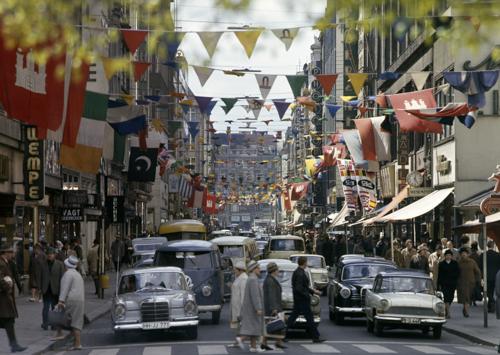Listen to New Voices on Studs Terkel our partnership with 826CHI-here! Read the Story
Showing 1 - 15 of 66 results
-
Tom Wicker discusses his book "Unto This Hour"
Feb. 17, 1984 Discussing the book "Unto this hour" a novel about the American Civil war with the author Tom Wicker.
-
Terkel comments and reads prose from Spain and Poland
Jun. 1983 Reading prose from Spain and Poland by editor of Northwestern Literary Magazine "Tri-Quarterly" with editor Reginald Gibbons.
-
Terkel comments and presents musical performance of Pat Ferrari, Ron Steele and Jim Crockett
Jun. 30, 1980 Presenting music and interviewing studio musicians Pat Ferrari, Ron Steele and Jim Crockett editor of Guitar Play Magazine.
-
Sylvia Kronstadt in conversation with Studs Terkel
Dec. 9, 1975 Interviewing writer and editor Sylvia Kronstadt.
-
Studs Terkel talks with Erich Lüth on his first hand experiences living in Hamburg through the rise and fall of Hitler ; part 1
1968 Erich Lüth discusses his experiences, observations, and accounts of life in Hamburg, Germany during the rise and fall of Hitler. He recounts how as a member of Parliament he brought in Hitler's, "Mein Kampf" and read portions aloud and was laughed at by his colleagues. He states they were blind to what Hitler declared in his book he would do and some are still blind by wanting to rub out their past, their history.
-
Studs Terkel interviews author-dramatist Frank Norman at his Bloomsbury Square Hotel ; part 1
1968 Terkel delves into the life of Frank Norman, a London ex-con who turned his life around and became a novelist and playwright by writing on his experiences. He wrote "Bang to Rights" shortly after his prison release which brought him great fame. He followed that with "The Monkey Pulled it's Hair" that had a U.S. release under the name "Don't Darling Me Darling". Norman opened up to Terkel discussing his illegitimacy, his illiteracy till age 14, his institutionalization in an orphanage which he turned into the novel "Banana Boy".
-
Studs Terkel continues his interview with Erich Luth in Hamburg discussing the aftermath of the war on Germany's youth ; part 3
1967 There is a silence in the tape from 3:48 to 3:58 due to Studs changing the tape. It should be noted that the word "clever" in this discussion means intelligent. The interview concludes at 35:36 where Studs offers his reflections on his stay. Luth is the retired Press Chief of Hamburg and has also helped with remunerations for the Jewish people in the aftermath of World War II. He has also facilitated detente between Israel and West Germany.
-
Soviet intellectuals discuss Soviet arts and culture
May. 28, 1962 Soviet intellectuals Tamara Mamedova, Nicolai Pogodin, and Anatol Safronov talk with Studs Terkel about their work with the Institute for Soviet-American Relations (U.S.) and Soviet arts and culture.
-
Ronnie Dugger discusses his book "Politician: The Life and Times of Lyndon Johnson"
Jul. 15, 1982 Ronnie Duggar’s book, “Politician: The Life and Times of Lyndon Johnson,” shows Johnson’s rise to power. Duggar explained that from a young age, Johnson knew to court power. While at the Teachers College in Texas, Johnson told his cousin, “It starts at the president’s office,” where Johnson was the president’s right arm man. Once in the Senate, Johnson chose to be on the Armed Services Committee because he knew Senator Richard Russell ran the Senate. Johnson courted powerful men and in exchange, these men would advance his career.
-
Ronnie Dugger discusses his book "On Reagan: The Man & His Presidency"
Nov. 29, 1983 Past radio transcripts of former President Ronald Reagan were being hidden or suppressed. Ronnie Dugger worked tirelessly at getting the transcripts so that people would learn the truth about Reagan. In Dugger’s book, “On Reagan: The Man & His Presidency,” Dugger points out that President Reagan was against the ERA. He didn’t believe in anti-trust, and he opposed every civil rights act every placed in front of him. Dugger said Reagan’s genius was that he’d get elected without people knowing of his records.
-
Robert Cromie reads from and discusses his book "Where the Steel Winds Blow"
1968 "Where the Steel Winds Blow" is Robert Cromie's anthology of 210 war poems. With his book, Cromie wanted to point out the impact of war. There are also war-related songs throughout the program.
-
Robert Bendiner discusses his book "Just Around the Corner" ; part 2
Aug. 23, 1967 In Robert Bendiner's book, "Just Around the Corner: A Highly Selective History of the Thirties," Bendiner covered Herbert Hoover's ineptness and Franklin Roosevelt's heroism. Bendiner also remembers vividly the moment when Huey Long did a jig on the Senate floor. Long further explained that the New Deal had to happen because it was what all the people, of both parties needed.
-
Robert Bendiner discusses his book "Just Around the Corner" ; part 1
Aug. 23, 1967 Although he was not a historian, Robert Bendiner said he believed he could provide accounts of events through a journalist's eyes with his book "Just Around the Corner: A Highly Selective History of the Thirties". It was a depressing time, recalls Bendiner, a time he hopes no one has to experience again. Businesses needed people to buy goods but there wasn't enough money for people to buy food let alone goods and materials. Bendiner recalls Riverside Drive was once affluent and picturesque. The view then turned to one full of Hooverville shacks.
-
Richard Pollak, editor, writer and investigative journalist, talks with Studs about his life and work.
Jun. 17, 1975 Mr. Pollak editor of "[More]" an investigative journalism magazine and author of "Stop the Presses, I Want To Get Off!", talks with Studs about his life and work. Both Studs and Mr Pollak read excerpts from the book.



